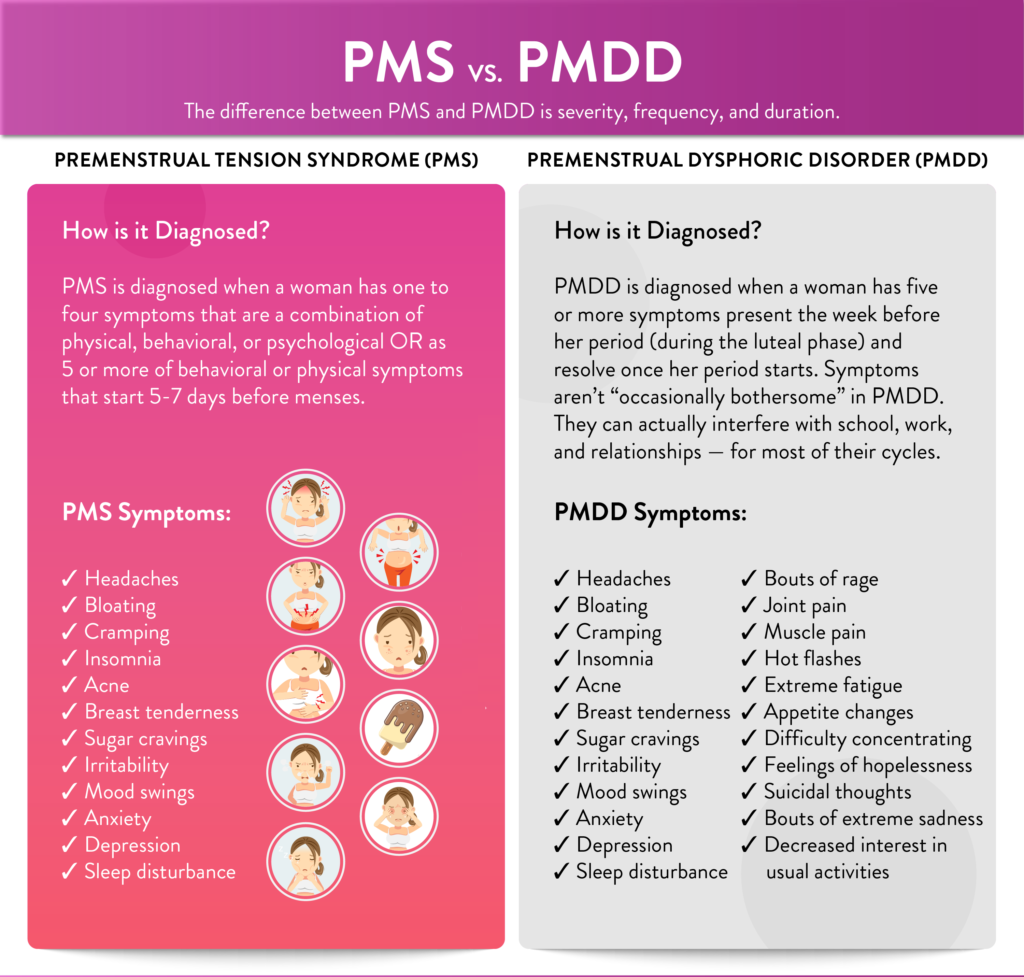Premenstrual Syndrome (PMS) and Premenstrual Dysphoric Disorder (PMDD) are conditions that affect a woman’s emotions, physical health, and behavior during certain days of the menstrual cycle, generally just before her menses. PMDD is similar to PMS but is more severe.
Causes of PMS and PMDD
The exact causes of PMS and PMDD aren’t fully understood but are thought to be linked to hormonal fluctuations during the menstrual cycle. Serotonin levels, a brain chemical (neurotransmitter) that’s thought to play a crucial role in mood states, could also affect PMS and PMDD symptoms.
Traditional Chinese Medicine (TCM) offers a holistic approach to addressing a wide range of health concerns, including premenstrual syndrome (PMS) and premenstrual dysphoric disorder (PMDD). Through modalities such as acupuncture, herbal medicine, herbal soaks, individualized formulas, and targeted protocols, TCM aims to rebalance the body’s energy and alleviate symptoms associated with menstrual irregularities. Let’s explore how each of these components can be incorporated into a comprehensive treatment plan for PMS or PMDD.
Traditional Chinese Medicine (TCM):
TCM is rooted in the concept of restoring balance and harmony within the body to promote overall health and well-being. It views PMS and PMDD as manifestations of imbalances in the body’s energy, or Qi, and blood circulation. By addressing underlying imbalances through various therapeutic modalities, TCM aims to alleviate symptoms and restore harmony to the body.
Acupuncture:
Acupuncture is a key component of TCM that involves the insertion of thin needles into specific points on the body to stimulate energy flow along meridian pathways. For PMS and PMDD, acupuncture can help regulate hormonal fluctuations, reduce stress, alleviate pain, and promote relaxation. By targeting specific acupuncture points associated with the reproductive system, digestion, and emotional well-being, acupuncture can address both physical and emotional symptoms of PMS and PMDD.
Herbal Medicine:
Herbal medicine plays a crucial role in TCM treatment protocols for PMS and PMDD. Herbal formulas are carefully tailored to address the individual’s unique pattern of symptoms and underlying imbalances. Common herbs used for PMS and PMDD include Dong Quai, Chaste Tree Berry, Black Cohosh, and Dang Gui. These herbs can help regulate menstrual cycles, alleviate cramps and bloating, improve mood stability, and reduce irritability and anxiety associated with PMS and PMDD.
Herbal Soak:
Herbal soaks are another therapeutic modality used in TCM to address menstrual irregularities and alleviate symptoms of PMS and PMDD. A medicinal herbal soak involves immersing the body in a warm bath infused with herbs known for their calming and hormone-balancing properties. Ingredients such as ginger, lavender, and rosemary can help soothe muscle tension, relieve pain, and promote relaxation, providing relief from physical discomfort and emotional stress associated with PMS and PMDD.
Individualized Formula:
One of the hallmarks of TCM is its emphasis on individualized treatment plans tailored to each patient’s unique pattern of symptoms and constitution. By taking into account factors such as menstrual cycle length, flow, and quality, as well as emotional and lifestyle factors, TCM practitioners can formulate personalized herbal remedies to address the specific needs of each individual.
Protocol for PMS or PMDD:
A TCM protocol for PMS or PMDD may involve a combination of acupuncture sessions, herbal medicine intake, herbal soaks, dietary and lifestyle recommendations, and stress management techniques. Treatment plans are typically customized based on the severity and pattern of symptoms, with the goal of alleviating discomfort, regulating menstrual cycles, and restoring overall well-being.
In conclusion, TCM offers a comprehensive and individualized approach to addressing PMS and PMDD through modalities such as acupuncture, herbal medicine, herbal soaks, individualized formulas, and targeted treatment protocols. By restoring balance and harmony to the body’s energy and addressing underlying imbalances, TCM can provide effective relief from symptoms and support women in achieving optimal menstrual health and well-being.


